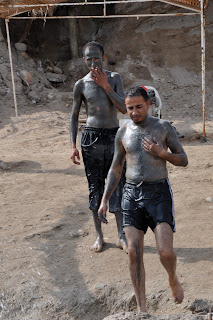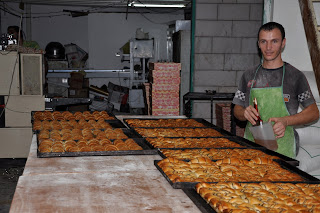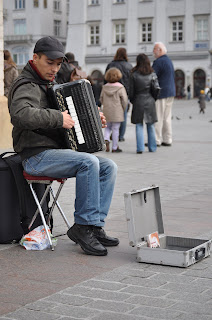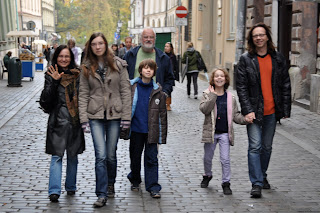 |
| Ahnad, Khitam's husband, & the wall |
I'm having a little more trouble with this blog than I anticipated, having just erased one I'd finished before starting one to Williams-Cone School 5th graders. No doubt I can/could reclaim it somehow, but instead, I'm forging ahead: one step forward, one back; two steps forward, one back...
 |
| Out of the bus, onto the road, going home |
First, the wall. It separates "them" from "us," always a bad way to organize. The "us" is the Israelis on the western side of the wall, with incursions into "the West Bank," which is considered Palestine...or is it? The "them" is the Palestinians on the eastern side of the wall. It stretches from Bethlehem, south of Jerusalem, north to I-don't-know-where. It is very much like the wall of a penitentiary. There is graffiti on the eastern side, some of it very creative, some touching, some scribbling; on the western side, I have seen no art work, good or bad. The wall is about twenty feet high, a constant reminder to Palestinians that they are occupied. Its effect is depressing and strange. As my friend Khitam said about the wall: "You know, the strange thing is, we're getting used to it. If we woke up one day and it was gone, we'd wonder where it was, what happened."
One of the effects of this occupation where Khitam and Ahmad live is that there is no traffic direction on the eastern side of the wall because the authority in this area is Israel, not Palestine, and Israel apparently choses not to handle traffic, unless it's going INTO Jerusalem. The Palestinian police are not allowed to manage traffic in this area so drivers are left to fend for themselves and the result is chaos at busy times of day, with a few brave souls trying to help with ad hoc traffic direction. There is also no - or very little - trash collection, so the roadside is often littered in these districts.
 |
| Inside old Jerusalem |
But on to Jerusalem and the old city. The old city is medieval. The city whose by Christ walked carrying a cross is at least ten feet below the city whose ancient stones you can walk today. The busiest entrance seems to be the Damascus Gate. Once inside, you see women in traditional dress, sitting on the pavement of large ancient stones, with fresh greens spread out beside or in front of them. Their heads are covered and their dresses are black with embroidered bodices (I hope my word selection and anatomical geography are correct). These are not new dresses nor do the women have closets full of them. On tables behind the women are displays of socks, underwear, blouses, shirts, pants, and more. Beyond the women are tables with fruits and vegetables, often manned by hawkers who shout out their goods and prices.
 |
| Candy in old Jerusalem |
 |
| Spices |
Then it's into the warren of byways; no highways here. Or roads. There are no cars inside most of the old city. There are carts and bikes, though not many of the later, and some roller skates, but mostly feet. The smells and sights are, if not overwhelming, at least whelming. Much of what you see you don't really want and then the scent of a spice shop stops you or the sight of Arabic sweets on trays makes your mouth water. "Ah," you think, "what would I cook with some of that?" or "I could use a sweet right now." Ahmad and I did stop at a sweets shop that specialized in kanafe bil jibne, an Arabic sweet that's sort of a combination of shredded wheat and a sweet creamy cheese, bathed in a sweet syrup. I didn't "need" it and it tasted awful good! I developed a taste for it in the sixties in Lebanon. Here, they talk about the difference between a knafe in Jerusalem and one in Nablus: "Ah, Nablus. That's the REAL kanafe."
That's enough for now, though there is so much more to tell. Onward tomorrow, insha'allah, to catch up with today. And onward right now to a blog for the Williams-Cone School 5th graders.
WILLIAMS - CONE SCHOOL 5th Graders
Greetings from just outside the city of Jerusalem, a city that is very VERY important to Christians, Muslims and Jews. It is the city where Christ was crucified. It is the city from which Mohamed, whose name is spelled many ways, rose to heaven to get the words of the Muslim holy book, The Koran. And for Jews, it is the city of David Solomon and the great temple.
 |
| An arch and a church steeple |
The old city of Jerusalem is several hundred years old. We call it a medieval city, for that's the period in history this Jerusalem was built. It has a wall around it to protect the people inside, and it has churches and mosques and temples that are hundreds of years old. he Jerusalem that Christ walked in is at least ten feet below the road you walk on today. Today's Jerusalem has lots of people and lots of tourists.
I was in old Jerusalem for several hours yesterday and a few hours today, and I heard Japanese, Italian, German, English, French and of course, Arabic and Hebrew, the languages of the people who share Jerusalem. Guides were giving tours to groups of people, some of whom must have arrived on buses and were seeing as much as they could in the time that they had.
 |
| The Dome of the Rock & a minaret |
One of the places they must have seen is The Dome of the Rock, a very holy mosque for Muslims. It is said that Mohamed rose from large rock inside the mosque and ascended to heaven to get the word of God fir The Koran, the Muslim holy book.
Have you heard of a "minaret"? It's a like a tower connected to a mosque, and five times a day, a "muezzin" calls people to prayer. That "muezzin" is like a singer announcing an important event. Although there are still muezzins at some mosques, others have a recording of the call to prayer that they play through loud speakers high up in the minaret. When a muezzin has a good voice, the call to prayer sounds sweet and strong. If the voice is not so good, or if you're standing too close to the loudspeakers, it doesn't sound so good.
In the picture of The Dome of the Rock and a minaret, you can also see "the wailing wall, the big wall below the mosque. That is a very holy place for Jews, said to be part of the Temple of Solomon from Biblical times.
So there is a lot of the past and a lot of the present here. I'll try to post another blog for you tomorrow, with more pictures. You can comment on the blogs if you want to and I'd like to know what you think and if you have any questions.
Study enough, and maybe a little extra, but not too much. Get some exercise and drink your juice.
Hi, Temple!
Grampa Al










































